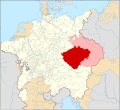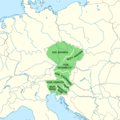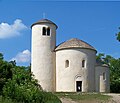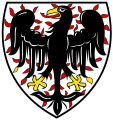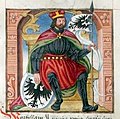Portal:Czech Republic
Welcome to the Czech Portal!
Vítejte na Českém portálu!

|

|

| |
The Czech Republic, also known as Czechia, is a landlocked country in Central and Eastern Europe. Historically known as Bohemia, it is bordered by Austria to the south, Germany to the west, Poland to the northeast, and Slovakia to the southeast. The Czech Republic has a hilly landscape that covers an area of 78,871 square kilometers (30,452 sq mi) with a mostly temperate continental and oceanic climate. The capital and largest city is Prague; other major cities and urban areas include Brno, Ostrava, Plzeň and Liberec.
The Duchy of Bohemia was founded in the late 9th century under Great Moravia. It was formally recognized as an Imperial State of the Holy Roman Empire in 1002 and became a kingdom in 1198. Following the Battle of Mohács in 1526, all of the Crown lands of Bohemia were gradually integrated into the Habsburg monarchy. Nearly a hundred years later, the Protestant Bohemian Revolt led to the Thirty Years' War. After the Battle of White Mountain, the Habsburgs consolidated their rule. With the dissolution of the Holy Roman Empire in 1806, the Crown lands became part of the Austrian Empire.
In the 19th century, the Czech lands became more industrialized, and in 1918 most of it became part of the First Czechoslovak Republic following the collapse of Austria-Hungary after World War I. Czechoslovakia was the only country in Central and Eastern Europe to remain a parliamentary democracy during the entirety of the interwar period. After the Munich Agreement in 1938, Nazi Germany systematically took control over the Czech lands.
Czechoslovakia was restored in 1945 and three years later became an Eastern Bloc communist state following a coup d'état in 1948. Attempts to liberalize the government and economy were suppressed by a Soviet-led invasion of the country during the Prague Spring in 1968. In November 1989, the Velvet Revolution ended communist rule in the country and restored democracy. On 31 December 1992, Czechoslovakia was peacefully dissolved, with its constituent states becoming the independent states of the Czech Republic and Slovakia.
The Czech Republic is a unitary parliamentary republic and developed country with an advanced, high-income social market economy. It is a welfare state with a European social model, universal health care and free-tuition university education. It ranks 32nd in the Human Development Index. The Czech Republic is a member of the United Nations, NATO, the European Union, the OECD, the OSCE, the Council of Europe and the Visegrád Group. (Full article...)
Selected article -
The Bartered Bride (Czech: Prodaná nevěsta, The Sold Bride) is a comic opera in three acts by the Czech composer Bedřich Smetana, to a libretto by Karel Sabina. The work is generally regarded as a major contribution towards the development of Czech music. It was composed during the period 1863 to 1866, and first performed at the Provisional Theatre, Prague, on 30 May 1866 in a two-act format with spoken dialogue. Set in a country village and with realistic characters, it tells the story of how, after a late surprise revelation, true love prevails over the combined efforts of ambitious parents and a scheming marriage broker.
The opera was not immediately successful, and was revised and extended in the following four years. In its final version, premiered in 1870, it rapidly gained popularity and eventually became a worldwide success. Until this time, the Czech national opera had only been represented by minor, rarely performed works. This opera, Smetana's second, was part of his quest to create a truly Czech operatic genre. Smetana's musical treatment made considerable use of traditional Bohemian dance forms, such as the polka and furiant, and, although he largely avoided the direct quotation of folksong, he nevertheless created music considered by Czechs to be quintessentially Czech in spirit. The overture, often played as a concert piece independently from the opera, was, unusually, composed before almost any of the other music had been written. (Full article...)Selected picture

Photographer: Honza Groh; License: Creative Commons CC-BY-SA
In this month
- 1 May 2004 – The Czech Republic joins the European Union
- 9 May 1974 – The Prague Metro begins operation
- 14 May 1855 – The book The Grandmother by Božena Němcová is released
- 27 May 1942 – An assassination attempt (pictured) on acting Reichsprotektor Reinhardt Heydrich in Prague as part of Operation Anthropoid results in him dying on 4 June – the villages of Lidice and Ležáky are razed to the ground in response
- 29 May 1975 – Gustáv Husák becomes President of Czechoslovakia, remaining in office until 1989
Categories
Selected biography -
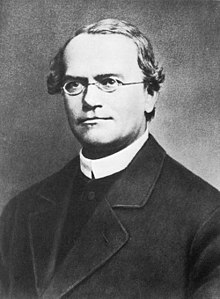
Gregor Johann Mendel OSA (/ˈmɛndəl/; Czech: Řehoř Jan Mendel; 20 July 1822 – 6 January 1884) was an Austrian-Czech biologist, meteorologist, mathematician, Augustinian friar and abbot of St. Thomas' Abbey in Brno (Brünn), Margraviate of Moravia. Mendel was born in a German-speaking family in the Silesian part of the Austrian Empire (today's Czech Republic) and gained posthumous recognition as the founder of the modern science of genetics. Though farmers had known for millennia that crossbreeding of animals and plants could favor certain desirable traits, Mendel's pea plant experiments conducted between 1856 and 1863 established many of the rules of heredity, now referred to as the laws of Mendelian inheritance.
Mendel worked with seven characteristics of pea plants: plant height, pod shape and color, seed shape and color, and flower position and color. Taking seed color as an example, Mendel showed that when a true-breeding yellow pea and a true-breeding green pea were cross-bred their offspring always produced yellow seeds. However, in the next generation, the green peas reappeared at a ratio of 1 green to 3 yellow. To explain this phenomenon, Mendel coined the terms "recessive" and "dominant" in reference to certain traits. In the preceding example, the green trait, which seems to have vanished in the first filial generation, is recessive and the yellow is dominant. He published his work in 1866, demonstrating the actions of invisible "factors"—now called genes—in predictably determining the traits of an organism. (Full article...)Did you know?

- ...that the Sedlec Ossuary is a chapel decorated with the bones of 40,000 people?
- ... that the leftist Czechoslovak Chemical Workers' Union was expelled from the OSČ trade union centre in 1922?
- ... that Czech international footballer Jan Suchopárek dislocated his shoulder while attempting a bicycle kick?
- ... that a 1926 voyage to Java inspired Czech poet Konstantin Biebl for the remainder of his life?
General images
Related portals
Topics

Czech lands: Bohemia • Moravia • Czech Silesia
History: Únětice culture • Boii • Marcomanni • Samo • Great Moravia • Přemyslid dynasty • Lands of the Bohemian Crown • Czech lands (1526–1648) • 1648–1867 • 1867–1918) • Czechoslovakia • Czech Republic
Geography: Lakes • Protected areas • Regions • Rivers
Law: Judiciary • Law enforcement • Supreme Court of the Czech Republic
Politics: Administrative divisions • Government • Constitution • Elections • Foreign relations • Army • Parliament • Political parties • President • Prime Minister
Economy: Banks • Czech koruna • Energy • Oil and gas deposits • Stock Exchange • Tourism • Transport
Culture: Architecture • Art • Cinema • Cuisine • Demographics • Education • Language • Literature • Media • Music • Philosophy • Prostitution • Public holidays • Religion • Sport • Television • Video games
Symbols: Flag • Coat of arms • National anthem (Kde domov můj)
Lists: Outline of the Czech Republic • List of Czech Republic–related topics
WikiProjects
Featured and good content
Things to do
Wikimedia
The following Wikimedia Foundation sister projects provide more on this subject:
-
Commons
Free media repository -
Wikibooks
Free textbooks and manuals -
Wikidata
Free knowledge base -
Wikinews
Free-content news -
Wikiquote
Collection of quotations -
Wikisource
Free-content library -
Wikiversity
Free learning tools -
Wikivoyage
Free travel guide -
Wiktionary
Dictionary and thesaurus







